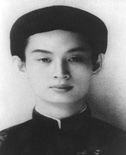PHẬT GIÁO HÒA HẢO
HARMONY BUDDHISM
Lữ Bố Lã Bố
Lã Bố hay Lữ Bố (chữ Hán: 呂布, bính âm: Lǚ Bù; 160? - 199), tự Phụng Tiên (奉先), là một viên tướng lĩnh nổi tiếng vào cuối thời Đông Hán trong lịch sử Trung Quốc.
Do có công diệt trừ gian thần Đổng Trác, ông được Hán Hiến Đế phong tước Ôn hầu, nên còn được gọi là Lã Ôn hầu (呂溫侯), ban giả tiết, nghi trượng ngang hàng Tam công. Sau này Lã Bố đã tham gia cuộc chiến quân phiệt, tranh chấp với các thế lực chư hầu lân cận như Lý Thôi-Quách Dĩ, Tào Tháo, Lưu Bị, Viên Thuật, nhưng cuối cùng bị thất bại.
Lã Bố nổi tiếng võ nghệ dũng mãnh, giỏi cưỡi ngựa bắn cung, được xưng tụng là Phi tướng (飛將). Ông có một con ngựa chiến đặc biệt, thường được gọi là Xích Thố nên người thời đó có câu "Nhân trung Lã Bố, mã trung Xích Thố" (Người có Lã Bố, ngựa có Xích Thố). Tuy nhiên, Lã Bố không có tài mưu lược như nhiều đối thủ chính trị khác, lại mang tiếng xấu là phản phúc vô thường khi hai lần trở mặt giết chủ, cuối cùng bại trận và bị Tào Tháo ra lệnh xử tử.
Ông được xem là bản sao chân thật nhất của Nam Cung Trường Vạn, cũng là một vị dũng tướng nổi danh thời Xuân Thu. Đều cùng là những nhân vật có sức mạnh vô địch nhưng lại có những kết cuộc bi thảm.
Lu Bu
Lü Bu ( pronunciation (help·info)) (Son of the people) (died 7 February 199), courtesy name Fengxian, was a military general and warlord who lived during the late Eastern Han dynasty of Imperial China. Originally a subordinate of a minor warlord Ding Yuan, he betrayed and murdered Ding Yuan and defected to Dong Zhuo, the warlord who controlled the Han central government in the early 190s. In 192, he turned against Dong Zhuo and killed him after being instigated by Wang Yun and Shisun Rui, but was later defeated and driven away by Dong Zhuo's followers.
From 192 to mid-195, Lü Bu wandered around central and northern China, consecutively seeking shelter under warlords such as Yuan Shu, Yuan Shao and Zhang Yang. In 194, he managed to take control of Yan Province from the warlord Cao Cao with help from defectors from Cao's side, but Cao took back his territories within two years. In 196, Lü Bu turned against Liu Bei, who had offered him refuge in Xu Province, and seized control of the province from his host. Although he had agreed to an alliance with Yuan Shu earlier, he severed ties with him after Yuan declared himself emperor – treason against Emperor Xian of Han – and joined Cao and others in attacking the pretender. However, in 198, he sided with Yuan Shu again and came under attack by the combined forces of Cao and Liu, resulting in his defeat at the Battle of Xiapi in 199. He was captured and executed on Cao's order.
Although Lü Bu is described in historical and fictional sources as an exceptionally mighty warrior, he was also notorious for his temperamental behaviour. He switched allegiances erratically and freely betrayed his allies, and was noted for his poor planning and management skills. He was always suspicious of others and could not control his subordinates. All these factors ultimately led to his downfall. In the 14th-century historical novel Romance of the Three Kingdoms, the details of his life are dramatised and some fictitious elements – including his romance with the fictional maiden Diaochan – are added to portray him as a nearly unchallenged warrior who was also a ruthless and impulsive brute bereft of morals. https://en.wikipedia.org/wiki/Lu_Bu

